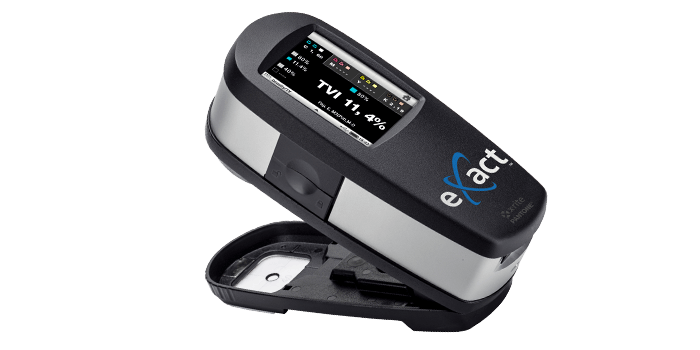Densitometers for Color Printing
There are different levels of process control for print. While visual comparisons can provide a rudimentary judgment of a match, they are also very subjective, and thus not very accurate or repeatable. While spectrophotometers are preferred for many printing operations, X-Rite densitometers can be used for CMYK density control. Browse our digital densitometers below, read our blog to find out if you need a spectrophotometer or densitometer or contact our team to discuss your needs.

eXact™ Basic Plus Reflection Densitometer
Densitometer with Pass/Fail
Need a device to measure all aspects of CMYK in the pressroom? The eXact Basic Plus automatically detects color and patch type and compares production density measurements against stored standards with pass/fail indication. The eXact Basic Plus can help increase efficiency by decreasing measurement time and improving print accuracy.

eXact™ Basic Reflection Densitometer
Densitometer for CMYK jobs
Looking for a simple device to measure density on press? The eXact Basic densitometer is designed specifically for CMYK jobs, enabling you to achieve and maintain accurate color throughout the run. With the eXact Basic, you can replace visual trial and error with fact-based color control for improved accuracy and consistency.
What is Print Density?
Density is the most basic measurement of the mechanical characteristics of print. Reflective density is calculated from the amount of light that is reflected from the substrate (paper, film, etc.) and ink. It is a simple way to evaluate changes in the ink film thickness or ink concentration that is being laid down. As ink thickness or concentration increases, more light is absorbed and less light is reflected, so the instrument reports the darker appearance as higher density.
What Is a Densitometer Used For?
A reflection densitometer is used to measure color through red, green and blue filters, similar to those used for color separation, to provide press operators with quantitative actionable feedback. Densitometers measure changes that result from mechanical changes on press, including solid ink density, tone value increase/dot gain, and ink trap.
Is a Color Densitometer the Same as a Spectrophotometer?
No, a densitometer does not take a color measurement. The filters make their complimentary color inks look dark, thus it has been said that densitometers “see” in black and white. Therefore, the term “color densitometer” is a misnomer.
Why Do I Need a Densitometer?
Any change on press can change the mechanical print characteristics. A digital densitometer can provide press operators with quantitative actionable feedback about these mechanical print characteristics.
- A change in ink density can be a direct result of the change of ink film thickness or volume that is applied.
- A change in dot gain can be a result of a change in impression pressure or the blanket and packing condition.
- Ink trap is a measure of how well an ink transfers to a substrate with a previous ink applied.
Using a digital densitometer to monitor mechanical print characteristics is a good foundation to process control and critical to consistently reproduce continuous tone images and graphics.
For accurate results, be sure to calibrate your densitometer regularly.
What is Density Measurement?
Density is different than color. Density only represents how light or dark a color is, not if the color is correct. A digital densitometer can take two types of measurements to control density on press:
1 - Four-Color Process Control Can Be Monitored with a Traditional Densitometer
The ink pigment load is very consistent on an offset press. A change in density is directly related to a change in ink film thickness. On a flexographic press, the ink load may change with concentration of the ink. The addition of extender or water to flexographic ink will result in less ink pigment transferring to the substrate, and this will be lighter, with a lower density value. With evaporation of the ink carriers, the flexographic ink concentration will increase, and measure as a higher density. Using the density values of the Cyan, Magenta, Yellow and Black solid inks to monitor and correct the ink film thickness or concentration is key to press control.
- Tone Value, also known as dot area, is the measurement of printed screen tint values and conveyed as a percentage of the solid ink density. Tone value increase (TVI) is also commonly known as dot gain. TVI represents the difference between the printed tone value, and the tone value in the original file. Depending on your print process and press calibration method, typical normal CMYK TVI values range from 16-22%.
- Ink Trap/Apparent Trap indicates how well a wet ink will transfer to the substrate and previous ink. Measuring trap is a way to predict a color shift in your overprint colors. However, the press conditions may limit the ability to achieve good ink trapping. Several press variables can influence ink trap, some are controllable by the operator, such as press speed, or dryer settings on presses that have dryers in between press units. The ink tack may be affected by the offset press fountain solution or ink film thickness. Some variables require changes that are beyond the operator’s control, such as the ink tack specified in the offset ink. In this case, the ink vendor may be able modify the ink with additives or even switch to a different ink system that has a different tack behavior.
- Print Contrast values such as “flat” (low print contrast values) versus “jumps off the page” (high print contrast values) correlate well with the subjective evaluation of print quality. Compared to mid-tone dot gain values, which change with ink film thickness and therefore density, high print contrast values require both high density and sharp printing to maintain shadow detail. During production, it is often used as a guide for maintaining proper ink/water balance, and a deterioration of contrast over the run may indicate a need for blanket washing.
The eXact Basic is a traditional densitometer for four-color process density process control.
2 - Spot Ink Process Control Requires an Advanced Densitometer
The built-in filters of a traditional densitometer are optimized for each of the process ink colors. These filters are not optimal for all spot ink colors. When measuring spot colors with this traditional filter set, a densitometer may attempt to select the filter automatically. Spot Color Tone Value (SCTV) calculates the tone value of spot color inks (ISO 20654:2017). This method uses the spectral reflectance values to produce tone values between the paper (0%) and solid ink (100%). A basic densitometer cannot provide these values because SCTV tone values are different than CMYK tone values.
To measure the density of a spot ink color, you need the eXact Basic Plus densitometer or an eXact spectrophotometer to measure a spot color at the optimal spectral wavelength for the ink.
Which Densitometer is Best?
- For basic four-color process density process control, the eXact Basic provides the capabilities of the traditional densitometer.
- For spot color density and tone value measurements, eXact Basic Plus offers more advanced density functions.
- The eXact Family is upgradeable. For more color control or to align your production to a print standard like GRACoL, SWOP, FOGRA, etc., you can upgrade your eXact densitometer to an eXact spectrophotometer.
- If you're looking for a transmission densitometer, X-Rite also offers a range of transmission densitometers for film measurement.
What can you expect when looking into a Spectrodensitometer Price?
Since densitometers measure density, not color, the term spectrodensitometer is a misnomer.
To request pricing for a densitometer, fill out the form on our website or contact your local Sales Representative.
Learn More About Digital Densitometers
Read our blog to learn more about density measurements, or get in touch to speak with a Color Expert about your specific densitometer needs.